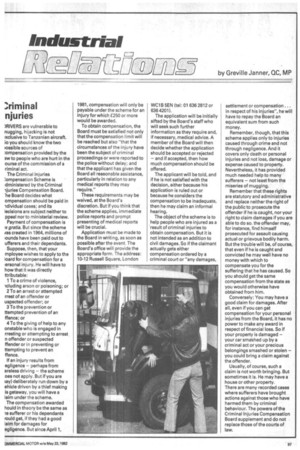riminaI njuries
Page 89

If you've noticed an error in this article please click here to report it so we can fix it.
)RIVERS are vulnerable to nugging, hijacking is not !xclusive to Tanzanian aircraft. ;o you should know the two Possible sources of :ompensation provided by the 3W to people who are hurt in the ourse of the commission of a riminal act.
The Criminal Injuries :ompensation Scheme is dministered by the Criminal ljuries Compensation Board. he Board decides what ompensation should be paid in idividual cases; and its lecisions are subject neither to ppeal nor to ministerial review. Payment of compensation is .x gratia. But since the scheme was created in 1964, millions of iounds have been paid out to ufferers and their dependants. Suppose, then, that your mployee wishes to apply to the board for compensation for a .ersonal injury. He will have to how that it was directly ttributable:
1 To a crime of violence, icluding arson or poisoning; or 2 To an arrest or attempted rrest of an offender or uspected offender; or 3 To the prevention or ttempted prevention of an ffence; or 4 To the giving of help to any onstable who is engaged in rresting or attempting to arrest n offender or suspected ffender or in preventing or ttempting to prevent an ffence.
If an injury results from egligence — perhaps from areless driving — the scheme oes not apply. But if you are ;ay) deliberately run down by a ehicle driven by a thief making is getaway, you will have a laim under the scheme. The compensation awarded hould in theory be the same as le sufferer or his dependants rould get, if they had a good laim for damages for egligence. But since April 1, 1981, compensation will only be payable under the scheme for an injury for which £250 or more would be awarded.
To obtain compensation, the Board must be satisfied not only that the compensation limit will be reached but also "that the circumstances of the injury have been the subject of criminal proceedings or were reported to the police without delay; and that the applicant has given the Board all reasonable assistance, particularly in relation to any medical reports they may require."
These requirements may be waived, at the Board's discretion. But if you think that the scheme applies, immediate police reports and prompt presenting of medical reports will be crucial.
Application must be made to the Board in Writing, as soon as .possible after the event. The Board's office will provide the appropriate form. The address: 10-12 Russell Square, London WC1B 5EN (tel: 01 636 2812 or 636 4201).
The application will be initially sifted by the Board's staff who will seek such further information as they require and, if necessary, medical advice. A member of the Board will then decide whether the application should be accepted or rejected — and if accepted, then how much compensation should be offered.
The applicant will be told, and if he is not satisfied with the decision, either because his application is ruled out or because he considers the compensation to be inadequate, then he may claim an informal hearing.
The object of the scheme is to help people who are injured as a 'result of criminal injuries to obtain compensation. But it is not intended as an addition to civil damages. So if the claimant actually gets either compensation ordered by a criminal court or "any damages,
settlement or compensation... in respect of his injuries", he will have to repay the Board an equivalent sum from such money.
Remember, though, that this scheme applies only to injuries caused through crime and not through negligence. And it covers only death or personal injuries and not loss, damage or expense caused to property. Nevertheless, it has provided much needed help to many sufferers — not least from the miseries of mugging.
Remember that these rights are statutory and administrative and replace neither the right of the public to prosecute the offender if he is caught, nor your right to claim damages if you are able to do so. the offender may, for instance, find himself prosecuted for assault causing actual or grievous bodily harm. But the trouble will be, of course, that even if he is caught and convicted he may well have no money with which to compensate you for the suffering that he has caused. So you should get the same compensation from the state as you would otherwise have obtained from him.
Conversely: You may have a good claim for damages. After all, even if you can get compensation for your personal injuries from the Board, it has no power to make any award in respect of financial loss. So if your property is damaged — your car smashed up by a criminal act or your precious belongings smashed or stolen — you could bring a claim against the offender.
Usually, of course, such a claim is not worth bringing. But sometimes it is. He may have a house or other property.
There are many recorded cases where sufferers have brought actions against those who have harmed them by criminal behaviour. The powers of the Criminal Injuries Compensation Board supplement and do not replace those of the courts of law.






























































































